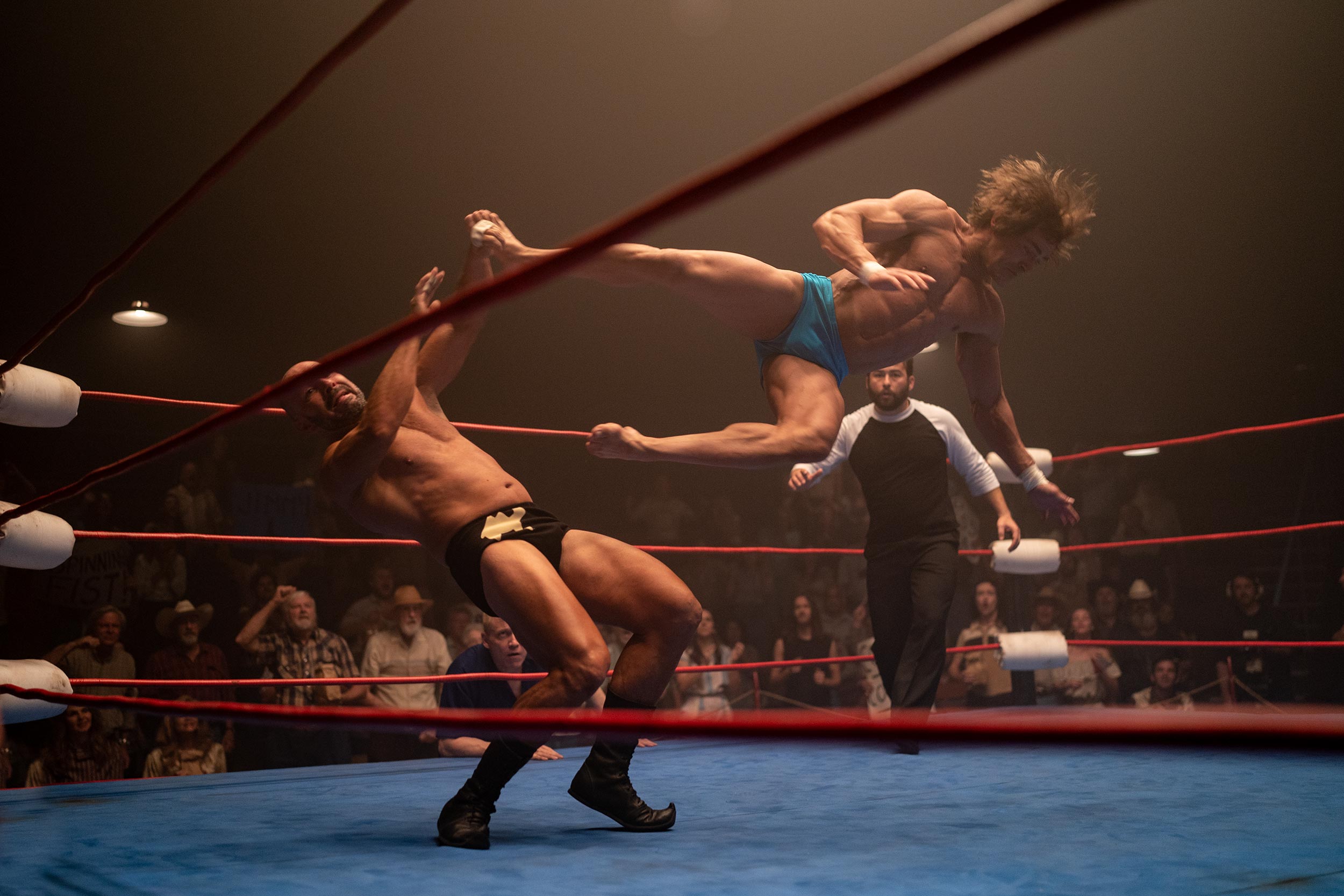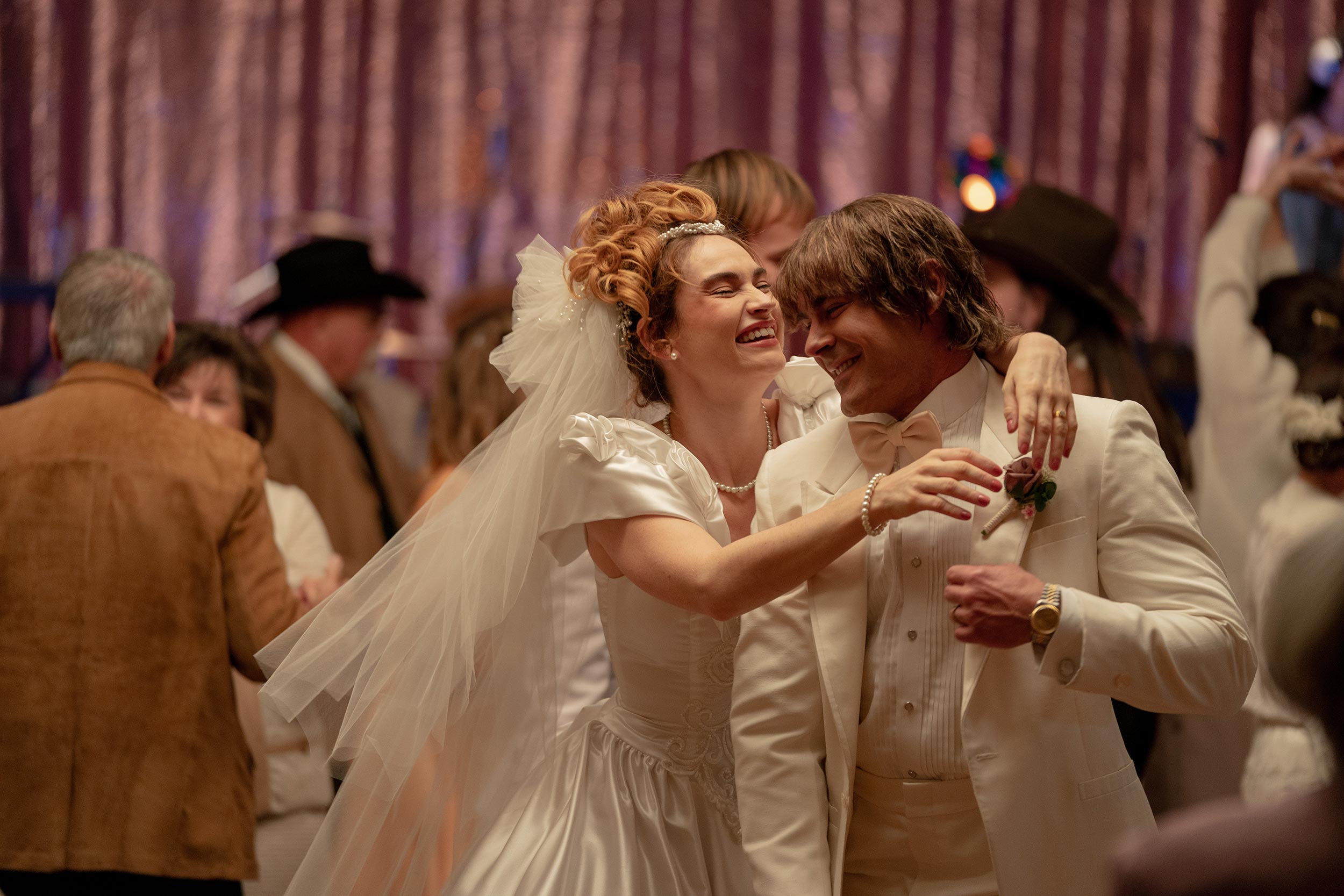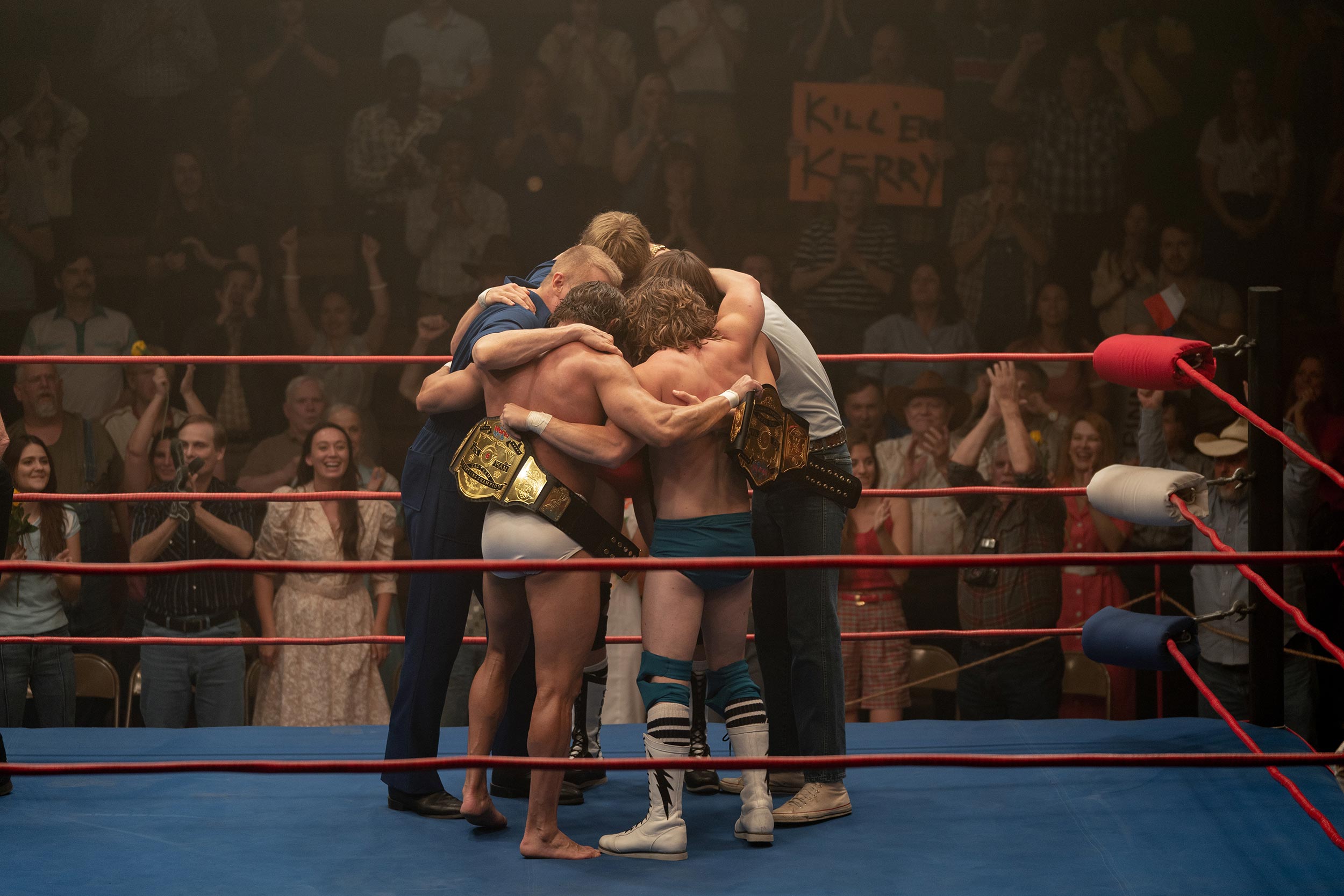Sean Durkin’s third film renders the Von Erich wrestling family as a American tragedy
My experience of The Iron Claw began before I set foot in the theater—wandering in the wrong entrance, I stumbled into a vertically imposing Park Avenue lobby where I asked the doorman for directions. He pointed me next door before asking what I’d be seeing, to which my reply garnered a look of lit-within recognition. He asked that I give him my review. A little over two hours later, I skipped back over to the lobby and told him first about the wrestling choreography, then the gravitas, then the bodies as costumes. “I met Andre the Giant in an elevator during Wrestlemania V,” the doorman said. “I was 14. It was incredible”
Writer-director Sean Durkin (Martha Marcy May Marlene) felt a similar childhood wonder watching the Von Erich brothers compete live. He recalls tracking down VHS tapes of their fights in England, falling in love with the Texan wrestlers’ high-flying stunts that have since shaped the sport today. Despite his across-the-pond heritage, Durkin wrote in a press release that he wanted to make “a true Greek Tragedy in the American Heartland,” one that highlighted the pitfalls of familial pressure and narrowly-defined masculinity. A tale of this variety requires a bit of necessary flattening for the sake of cohesion: Each Von Erich brother takes on a different archetype in The Iron Claw. Kevin (Zac Efron) is the eldest brother and de facto most responsible, Kerry (Jeremy Allen White) the golden boy, David (Harris Dickinson) the charming showman, and Mike (Stanley Simons) the sensitive youngest. Together, they will bring home the National Wrestling Alliance Heavyweight Championship, a feat their father Fritz was never able to accomplish.
The Von Erichs have been likened to the Kennedys of wrestling, inducted into the WWE hall of fame in 2009. Their deaths domino in a way that’s nearly incomprehensible: firstborn Jack Jr. was shocked by a trailer tongue, fell face first into a puddle, and drowned at the age of 5. David died of “acute enteritis,” though his rival Ric Flair alleges that it was a drug overdose. Kerry and Mike died by suicide. Chris Von Erich—the youngest brother never mentioned in the film—also killed himself not longer after Mike. Of Fritz Von Erich’s six sons, only Kevin survives. We witness the familial implosion through his perspective, a vantage Durkin leverages to turn this real-life tragedy into a heartbreaking drama.
“There’s nothing fake about what we do.” Kevin tells love-interest Pam Adkisson (Lily James, our audience proxy) on their first date. His observation works double-time, calling out the storytelling sleight of hand required for both professional wrestling and filmmaking. Getting a title and belt is a job promotion, demonstrating both ability and crowd response. Excising Chris from the story and smoothing over steroid and painkiller use keep what’s already a dense film moving. Early on, Kevin and David talk plays with their tag team opponents in the locker room, the latter of which request that the Von Erichs “don’t fuck up [their] hair too much.” We then watch the match, David and Kevin slamming their opponents into the mat, resulting in very real bruises and sweat. Durkin’s willingness to acknowledge artifice is brilliant: As wrestling fans enjoy the Von Erichs’ physical feats, we the film fans enjoy the inspired by a true story behemoth he crafts.
The Iron Claw’s ensemble delivers great performances across the board. Harris Dickinson maintains his indie charm from Triangle of Sadness, and it’s a loss of levity when he exits the film early. Efron delivers a career-defining performance as the eldest living Von Erich, shouldering the burden of grief with intense physicality both in and out of the ring. His body looks inflated with how his veins strain between muscle and skin, characteristics only further on display in jorts and an orange mesh tank top à la Tyler Durden, a macho man figure Durkin sartorially invokes to skewer misguided masculinity. Jeremy Allen White’s frenetic favorite energy crackles against Efron’s responsible cool head—even a phone call shot in different rooms radiates brotherly competition. Durkin’s script gives enough airtime for each actor to plumb the depths of pressure, inheritance, and bottled emotion, excelling within a tragic archetype.
At points, the auteur’s decision to smooth over rougher aspects of the Von Erich legend goes too far. David’s alleged drug overdose is never mentioned. Steroids get two shots in total, but once again, not discussed. While Maura Tierney—Von Erich matriarch Dottie—does her best to make her character arc feel lived in, her decision to relinquish her homemaker role feels like a vague “women’s rights” moment that wouldn’t come naturally to a Texan woman who’s lived her whole life believing in God and losing her sons. The attempt to find a positive conclusion to this story blunts the endless, clear grief that The Iron Claw sustains so well for the bulk of the film. We lose the enduring pain Efron captures in the first act speaking about his brother Jack’s death: “He just wasn’t there to play one day.”
When Kevin vies for his shot at the National Wrestling Alliance’s Heavyweight Championship against incumbent Harley Race, he gets thrown onto his back. This is a non-title match; the most Kevin can do is make a case for himself to eventually go up against Race, creating a story that will garner ESPN views and an eventual belt. Yet the champion goes rogue, throwing Kevin out of the ring then slamming him onto the floor. We see pain shoot through his body as he gets the wind knocked out of him. Despite the cuts from the real life drama, The Iron Claw still creates breathless thrill within a fated tragedy, capturing that same emotional response the doorman recalled about seeing Andre the Giant thirty years ago. In a fixed match, Kevin still hits concrete. In a fated story, Durkin still finds truth.











